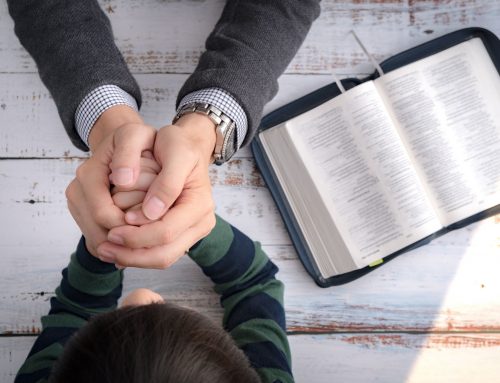I Kings 19:1-15
A Sermon by Pastor Eric Smith
Published On: July 3, 2022
We’re talking about Karma today, all of us have some relationship with the concept, although we may not understand it in the same way.
We’ll start with a story…
When Sarah Darling of Kansas City, Missouri, dropped some change in a homeless man’s cup, she didn’t realize her engagement ring fell in, too. Billy Ray Harris, the man holding the cup, discovered the ring later. He got it appraised—and was offered $4,000 for it on the spot. Instead of selling it, though, he saved it for Darling, who came back the next day.
To thank the homeless man, Darling and her husband set up a crowdfunding page to raise $1,000 for him. But donors went above and beyond, giving more than $190,000 to Harris. The money helped him make a down payment on a house and buy a car, and the media attention helped him reunite with his family, who hadn’t seen him in 16 years.
That’s a good story. A karma story. What folks call good karma.
Here’s another one… this is the message on a note that was taped to a shared office refrigerator.
To the culprit who ate what you thought were two peanut butter ice cream bars:
Those were actually laxatives for my dog that had to be kept frozen. I hope you enjoyed your weekend of lava butt. Don’t steal it from the fridge if it’s not yours. Karma’s a bitch.
Love… Constipated Dog Owner
I had a karma conversation with our daughter Robyn, who is pretty well-versed in such things. She said she saw her favorite karma quote in a woman’s restroom. The quote was…
Karma’s only a bitch if you are…
Let’s consider the words of the Apostle Paul. In the passage you heard earlier he said…
…you reap whatever you sow.
…if you sow to the Spirit,
you will reap eternal life from the Spirit
(Galatians 6: 7 and 8)
Paul goes on to say that sowing bad stuff will reap bad stuff. In the words of the vernacular… what goes around comes around.
Paul continued…
So let us not grow weary in doing what is right, for we will reap at harvest-time … whenever we have an opportunity, let us work for the good of all…
Within this concept, and many more, there is a strong connection between Christian faith and Buddhism.
Marcus Borg has a book called Jesus and Buddha: the Parallel Sayings. The book draws parallels between the wisdom and teachings of Jesus and those of the Buddha. It is amazing how many have essentially the same message. Here are three examples:
Jesus said: Do to others as you would have them do to you.
Buddha said: Consider others as yourself.
Jesus said: This is my commandment, that you love one another as I have loved you. No one has greater love than this, to lay down one’s life for one’s friends.
Buddha said: Just as a mother would protect her only child at the risk of her own life, even so, cultivate a boundless heart towards all beings. Let your thoughts of boundless love pervade the whole world.
Jesus said: You will know the truth, and the truth will make you free.
Buddha said: One who acts on truth is happy in this world and beyond.
There is a monastery in the Mekong Delta of Vietnam. It was built on an island by a master of peace known as the Coconut Monk. Many Buddhist monks lived there during the war years. At the end of the island there is a hill and, on top of it, was an enormous fifty-foot tall statue of a standing Buddha. Next to the Buddha stood an equally tall statue of Jesus. Their arms were around each other’s shoulders and they were smiling.
The bond of love depicted by the statues represented the universal wisdom that they share. They both taught laws of the heart… the eternal fragrance of virtue…the path of generosity… the power of faith, contentment, and compassion. (Jack Kornfield)
Sadly, a few years later in the post-war tumult, the statues were destroyed.
Karma describes the law of cause and effect: what we sow, we reap.
Consider this: Suppose a man picks up a knife and plunges it into another man’s body causing his death. What kind of karma has he created?
If the wielder of the knife is a skilled surgeon undertaking a risky procedure to relieve suffering, the karma is positive, even if the patient dies. But the same act done out of anger will produce the painful karma of murder.
Like this story of a surgeon and a murderer, Karma is the result of our intention. Intention and motivation are the roots of karma.
When our intention is to live with nobility, respect, and compassion, and we act from these intentions, we shape a positive future. When our motivation is rooted in anger or unworthiness or self judgement or fear or depression, and we act from these intentions, we perpetuate painful patterns.
There is, what we might call, a karma continuum… at the one end are noble intentions of living a self-sacrificing life of giving and service… at the other end of the continuum are intentions that are transitory… the grasping of things taking priority over people.
The Buddhist background of the word Karma is as a compound word, karma-vipka, which means action and result… or what we call cause and effect.
An ancient Chinese Buddhist saying describes the concept this way:
From intention springs the deed,
From the deed springs the habits,
from the habits grow the character,
From character develops destiny.
Consider Andrew Carnegie, who was very rich but also was a great philanthropist. He was asked about his continuing accumulating of riches by a reporter, who said, You could have stopped at any time, couldn’t you?… because you always had more than you needed.
Yes, that’s right, Carnegie replied, but I couldn’t stop. I had forgotten how to.
Our long-term intention, if we have one, is like a moral compass. When Jesus told the disciples to follow me, he invited them to take on a long-term intention. They were to adopt his values and his practices. And once they did, their karma got really rolling.
Jesus told his disciples, whatever you ask in my name I will do it. He knew that because they were following him with long-term intention, their karma was so good that God… (or the universe if you prefer) would deliver on that request. Call it prayer… they would reap what they sowed … and the results would emerge out of their good karma.
Think of good karma this way: it is the result of taking on Jesus’ values, or Buddha’s values, or the universal wisdom of wholesome humanity. Doesn’t matter what you call it. Christians call it living in the center of God’s will. It doesn’t matter what you call it, what matters is your intention… your moral compass. When the way, the truth, and the life of Jesus is a person’s intention incredible things show up, time after time after time. In the church we call them miracles.
I don’t want you to think that the good karma of noble intention will remove all of life’s challenges. It doesn’t. Good karma is a lighted pathway through the darkness that periodically surrounds us. In easier times it is a well-spring of joy and blessing.
I’ve been a pastor for many years. I’ve sat with many in grief, many with illnesses that led to their death. I have seen, over and over and over again, the beautiful spirituality of long held good intention in people’s lives. You’ve heard it said that the highway to hell is paved with good intentions? Not true. Just the opposite.
No matter how difficult things are… wonderful connections, loving expressions, or graceful moments emerge in abundance in the ultimate moments. People die, of course we do, we have term limits – but the quality of life of a person with a moral compass is… in Jesus words… eternal. We have eternal life.
But it isn’t out of nowhere… it’s karma baby.
So how’s your karma?
Well that’s why we’re here, right? We’re burnishing our intentions. We’re pulling them out and dusting them off and holding them up to examine them like a jeweler examines the many facets of a beautiful diamond. It may be in the rough, so might we, but there is the beauty of it in itself and of even more potential…
I think you have the idea.
I have one more story.
A friend told of having counseled a man who was falling out of love with his wife. He advised the man to think of all the ways he could make life happier for his wife and then do them. A few days later the counselor received a phone call in which the husband related this story:
Every day I leave for work, put in a hard day, come home dirty and sweaty, stumble in the back door, go to the refrigerator, get something to drink, and then go into the rec room and watch tv until suppertime. After talking to you, I decided I would do better than that in the future. So yesterday, before going home, I stopped at the florist and bought a bouquet of roses. Instead of going in the back door like usual, I went to the front door and rang the doorbell. My wife opened the door, took one look at me, and started to cry.
When I asked her what was wrong she said, “It’s been a horrible day. First Jonah broke his leg and had to have it put in a cast. I no sooner returned home from the hospital when your mother called and told me that she is coming to stay for three weeks. I tried to do the wash and the washing machine broke and there is water all over the basement. And now you … have to come home drunk!
These last words from the Apostle Paul in this passage to the Galatians…
So then, whenever we have an opportunity, let us work for the good of all…




